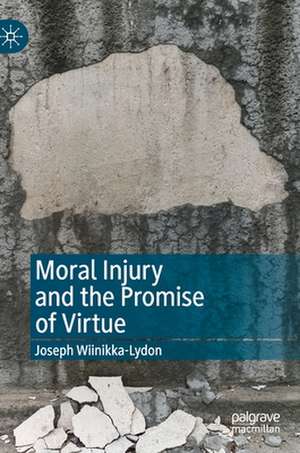Moral Injury and the Promise of Virtue
Autor Joseph Wiinikka-Lydonen Limba Engleză Hardback – 26 noi 2019
| Toate formatele și edițiile | Preț | Express |
|---|---|---|
| Paperback (1) | 585.26 lei 6-8 săpt. | |
| Springer International Publishing – 26 noi 2020 | 585.26 lei 6-8 săpt. | |
| Hardback (1) | 585.26 lei 6-8 săpt. | |
| Springer International Publishing – 26 noi 2019 | 585.26 lei 6-8 săpt. |
Preț: 585.26 lei
Preț vechi: 688.54 lei
-15% Nou
Puncte Express: 878
Preț estimativ în valută:
111.99€ • 117.22$ • 93.21£
111.99€ • 117.22$ • 93.21£
Carte tipărită la comandă
Livrare economică 31 martie-14 aprilie
Preluare comenzi: 021 569.72.76
Specificații
ISBN-13: 9783030329334
ISBN-10: 303032933X
Pagini: 203
Ilustrații: XIV, 203 p.
Dimensiuni: 148 x 210 mm
Greutate: 0.45 kg
Ediția:1st ed. 2019
Editura: Springer International Publishing
Colecția Palgrave Macmillan
Locul publicării:Cham, Switzerland
ISBN-10: 303032933X
Pagini: 203
Ilustrații: XIV, 203 p.
Dimensiuni: 148 x 210 mm
Greutate: 0.45 kg
Ediția:1st ed. 2019
Editura: Springer International Publishing
Colecția Palgrave Macmillan
Locul publicării:Cham, Switzerland
Cuprins
1. Introduction.- 2. From Subjectivity to Moral Subjectivity.- 3. Moral Subjectivity and the Language of Virtue.- 4. Tensile Moral Subjects.- 5. The Domination of Void.- 6. Moral Subjectivity, Moral Injury.- 7. Conclusion.
Recenzii
“Moral Injury and the Promise of Virtue offers original contributions to the moral injury conversation and is valuable reading for caregivers and community leaders supporting those who have suffered moral wounds of war and scholars of conflict and international relations seeking to avoid the tragedy of them occurring in the first place. It is also particularly relevant for moral theologians interested in understanding war and trauma though philosophical lenses of virtue and moral development … of moral injury.” (Darren Cronshaw, Studies in Christian Ethics, Vol. 35 (2), May, 2022)
Notă biografică
Joseph Wiinikka-Lydon is a researcher at the European Union-funded Center for Ethics at the University of Pardubice.
Textul de pe ultima copertă
“This book brings valuable interdisciplinary insights to the phenomenon of moral injury. Informed by the moral philosophy of Iris Murdoch, Wiinika-Lydon makes a compelling and eloquently argued case for the role of virtue ethics in illuminating aspects of moral injury that are often neglected by social scientific and clinical approaches”
–Maria Antonaccio, Professor of Religion, Bucknell University, USA
“Since coined by the legendary Jonathan Shay, ‘moral injury’ has sparked an interdisciplinary explosion of literature. Joseph Wiinikka-Lydon fills an important gap by addressing the question of what is actually ‘moral’ about ‘moral injury.’ He not only amplifies the complex phenomenon named ‘moral injury,’ but demonstrates how the language of virtue points beyond the moral to the existential.”
–Aristotle Papanikolaou, Professor of Theology, Fordham University, USA
“This book provides the first application of Iris Murdoch's moral philosophy to the field of War Studies and Trauma. Wiinikka-Lydon deftly argues that Murdoch's conception of virtue can not only be helpful, but vital, in providing a route to both reflectiveness and compassion.”
–Miles Leeson, Director of the Iris Murdoch Research Centre, University of Chichester, UK
This book turns to virtue language as an important resource for understanding moral injury, a form of subjectivity where one feels they can no longer strive to be good as a result of wartime experience. Drawing specifically on Iris Murdoch’s moral philosophy, and examining the experiences of civilians during the Bosnian War (1992-5), Joseph Wiinikka-Lydon argues that current research into war and current understandings of subjectivity need new ways to articulate the moral dimension of being a subject if we are to understand how violence affects one’s moral being and development. He develops an understanding of the human person as a tensile moral subject, onethat forefronts the moral challenges and vulnerability inherent in lives affected by war. With these resources, Wiinikka-Lydon argues for a moral vocabulary and images of the human as a moral being that can better articulate the experience of violence and moral injury.
–Maria Antonaccio, Professor of Religion, Bucknell University, USA
“Since coined by the legendary Jonathan Shay, ‘moral injury’ has sparked an interdisciplinary explosion of literature. Joseph Wiinikka-Lydon fills an important gap by addressing the question of what is actually ‘moral’ about ‘moral injury.’ He not only amplifies the complex phenomenon named ‘moral injury,’ but demonstrates how the language of virtue points beyond the moral to the existential.”
–Aristotle Papanikolaou, Professor of Theology, Fordham University, USA
“This book provides the first application of Iris Murdoch's moral philosophy to the field of War Studies and Trauma. Wiinikka-Lydon deftly argues that Murdoch's conception of virtue can not only be helpful, but vital, in providing a route to both reflectiveness and compassion.”
–Miles Leeson, Director of the Iris Murdoch Research Centre, University of Chichester, UK
This book turns to virtue language as an important resource for understanding moral injury, a form of subjectivity where one feels they can no longer strive to be good as a result of wartime experience. Drawing specifically on Iris Murdoch’s moral philosophy, and examining the experiences of civilians during the Bosnian War (1992-5), Joseph Wiinikka-Lydon argues that current research into war and current understandings of subjectivity need new ways to articulate the moral dimension of being a subject if we are to understand how violence affects one’s moral being and development. He develops an understanding of the human person as a tensile moral subject, onethat forefronts the moral challenges and vulnerability inherent in lives affected by war. With these resources, Wiinikka-Lydon argues for a moral vocabulary and images of the human as a moral being that can better articulate the experience of violence and moral injury.
Caracteristici
Argues that the languages and concepts developed by ethicists can be a resource for speaking about moral injury in a way that can bring out the moral stakes involved for survivors of violence Develops Iris Murdoch's understanding of virtue so that it can be applied to real life cases Engages sociologists, psychologists, and anthropologists researching issues of violence
